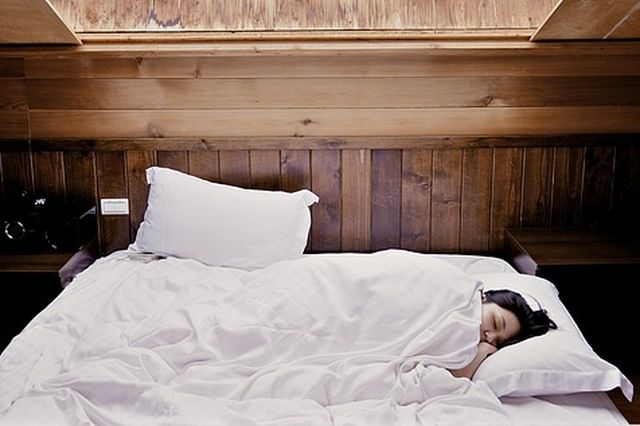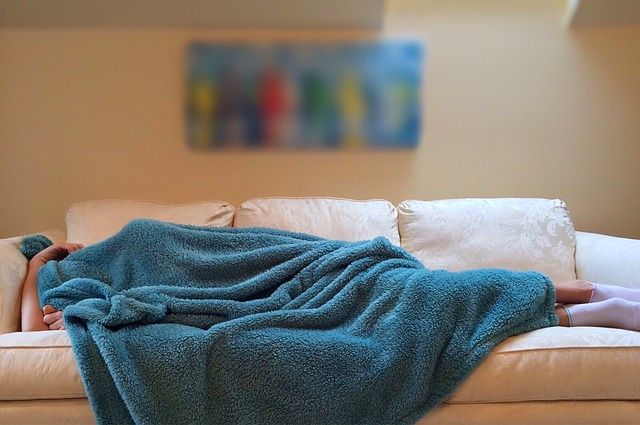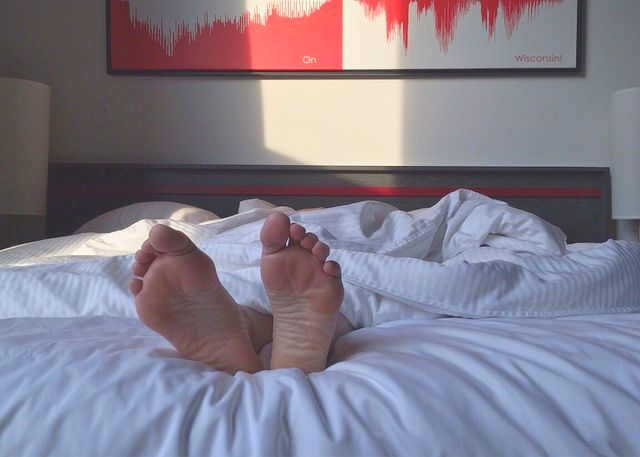
Think that sleep is a waste of time? Think again.
It may come as a surprise to many people that getting the recommended 7 to 8 hours of sleep every night is more important than you think. In fact, research tells us that the benefits of sleep range from being more productive the next day all the way to living longer.
Sleep loss on the other hand, is harmful to your health. It increases your risk of making mistakes and getting into accidents. Plus, it can also make you gain weight. For these reasons, it’s always good to try to get enough sleep.
Below are the immediate and long-term health benefits of sleep. You’ll probably be surprised to know that being sleep deprived for just two nights in a row is enough to affect how you feel and think.
Benefits of Sleep Infographic
The infographic below lists 20 little known benefits of sleep. We break down the benefits into those that affect you over the long term and those you immediately feel the next morning.
Click on image to enlarge
Share This Infographic On Your Site
Immediate Health Benefits of Sleep
1. Enough Sleep Prevents Headaches And Migraines
One thing you’ve probably noticed is that lack of sleep can trigger headaches. These headaches can come in a variety of forms. Two very common ones are migraines and tension headaches.
- Migraines are bad and painful. They often affect only one side of your head. Because of the intensity of the pain, they can disable you. This can lead you to stay in bed and do nothing for the entire day. What’s worse is that migraine headaches can last anywhere between a few hours to a few days.
- Tension headaches are milder. They aren’t as painful or debilitating as migraines. Often, you feel them in the top, sides or back of your head. Another distinction that makes them different from migraines is that noise and light don’t make them worse.
Because migraines often occur between 4:00 and 9:00 in the morning, scientists believe that it is related to your circadian rhythm.
Besides lack of sleep, too much sleep is also a well-known cause of headaches. Other sleep irregularities like jet lag and shift work are likewise triggers. In the same way, people who suffer from insomnia, parasomnias and sleep apnea also are more likely to experience migraines.
So what’s the link?
One study suggests that not getting enough REM sleep plays a role. REM or Rapid Eye Movement sleep is a phase in your sleep cycle where your dreams happen. During these 90 to 120 minute intervals, your body goes through certain events like increased dreaming, faster breathing and rapid darting of your eyes from side to side. REM sleep also allows your body to regulate many of its functions including your mood, memory, and learning.
Meanwhile, a separate study performed in 2011 observed that lack of sleep also increases the amount of proteins in your body which in turn causes chronic pain.
2. Lower Stress
Much like headaches, stress and sleep have a “chicken and egg” relationship. That is, not getting enough sleep increases your stress levels. And, when you’re stressed, it’s hard to get a good night’s sleep because you stay up worrying.
One problem with not getting enough sleep is that it increases your cortisol levels. Higher levels of cortisol put your body in a state of stress.
When this happens, your body goes into “fight or flight” mode. This prepares it to act in case of emergencies. To do so, it releases glucose into your bloodstream and also causes your blood pressure to rise. This allows you to have more energy and be more alert.
While being in a temporary state of stress isn’t a bad thing, it can cause health issues if it becomes chronic. This is something you can inadvertently do by always being sleep deprived.
In the long term, stress can cause anxiety, depression, inflammation and destroy relationships.
3. Improve Focus And Attention
You’ve probably noticed that it’s harder to focus after a poor night’s sleep. That’s because research suggests that sleep deprivation affects your “selective attention”.
Selective attention is your ability to focus on something and block out other things that are happening around you. This lets you put your attention on what you’re working on even if there are people talking on their phones or random noises around you.
So, when you’re sleep deprived, you tend to be less productive since other things happening around you can easily distract you.
Similarly, a 2009 study found that kids ages 7 and 8 who sleep less than 8 hours nightly are more likely to be hyperactive, inattentive, and impulsive.
Thus, it’s important for both adults and kids to get enough sleep. To help you do so, make sure you have a good sleeping environment, including the ideal mattress and pillows. This will help you excel at work and allow your kids to get better grades.
4. It Helps You Avoid Accidents And Errors

According to statistics, drowsy driving causes 100,000 crashes and 1,500 deaths yearly. Similarly, data shows that medical residents who slept more also make fewer serious errors.
Why?
The reason is that sleep deprivation affects your senses as well as your motor skills. This causes you to have trouble focusing while driving, noticing quick changes and being fast enough to react to sudden changes in conditions.
As a result, the AAA Foundation for Traffic Safety found that sleeping one or two hours less than the recommended 7 hours a night is enough to double the risk of getting into a car accident.
Even worse, if you sleep 4 to 5 hours the night before, you’re 4 times more likely to get into a car crash. This is about the same amount of risk brought about by drinking while intoxicated.
5. Better Reaction
One of the things we all need to do in life is to make split-second decisions. This can be in the office, driving your car or while playing sports.
Unfortunately, when you’re sleep deprived, your reaction time slows down. This makes you less able to quickly react in case something happens.
As a result, it can make you more prone to falls or slips, because you’re not able to recover in time. Similarly, it makes you a dangerous driver. When you’re tired, your focus and reaction times are bad. This is why there are many road accidents caused by drowsy driving.
Research shows that even well-trained individuals are affected by this. Both college athletes and West Point military cadets experienced slower reaction times after a poor night’s sleep.
6. See And Speak Better
One of the things we often take for granted is our ability to do simple things. This includes talking or walking.
With these simple tasks, sleep also plays an important role. It allows your brain to coordinate with your body to perform simple movements.
As such, not getting enough sleep affects even the simplest things in life. For example, poor sleep can cause tunnel and double vision. Meanwhile, staying awake too long can cause slurred speech.
According to a study in the U.K., sleep deprivation reduces your ability to generate words properly. It also affects proper intonation, which is the rise and fall of your voice when you pronounce words. Thus, you’ll sound more monotone or talk with a flat voice.
7. You’ll Have Better Sex
If you feel tired and don’t often feel like having intimate relations with your partner, you may want to check how well you’ve been sleeping. Research shows that not getting enough sleep reduces your sex drive. It also increases your risk of sexual dysfunction.
One study points out that men who were sleep deprived had lower levels of testosterone. As a result, they were less interested in having sexual relations.
In contrast, getting the proper amount of sleep helps restores your sex hormones. Thus, helping you get back to your regular sex life.
8. Getting Enough Sleep Helps Reduce Chronic Pain
Lack of sleep makes you more sensitive to pain. Unfortunately, pain also makes it harder to sleep later on that night. As a result, regularly missing out on sleep can lead to a vicious cycle that keeps you awake at night in more pain.
Chronic pain increases your stress levels and reduces your quality of life. When you don’t get enough sleep, you become less tolerant to pain.
The problem is, it doesn’t take a lot of nights to cause this. According to a study by the University of Washington, middle-aged women experienced a 24% decrease in physical pain tolerance after the third night of sleep disruption.
So, skipping a few hours of sleep a night for three consecutive days is enough to make you significantly more sensitive to feeling aches and pains that normally may not have bothered you.
9. You’re Less Easily Irritated or Upset

Ever noticed that you’re more easily irritated or get angry faster when you don’t sleep well? Small things can tick you off because you’re in less control of your emotions.
Emotional reactivity is when you have a hard time controlling your immediate emotional reactions. This can be shouting at someone, feeling offended or getting angry due to events that you normally wouldn’t mind.
Poor sleep reduces your ability to control your reactions. This not only makes you moodier but can also make your behavior more erratic.
As a result, you may end up doing or saying things you may regret later on. All because you didn’t get enough sleep the night before.
10. Improves Productivity And Concentration
Good sleep lets you wake up refreshed and energized. This leads to better cognition, concentration, productivity, and performance.
When you’re well rested, you’re able to make better decisions, react faster and remember things. You’re also less likely to make mistakes and experience burnout.
Because you’re able to concentrate, you’re better at recovering from distractions or not noticing them at all.
11. Sleep Lets The Body Repair Itself
During sleep, your body works behind the scenes to repair damaged cells and tissues. It also produces more protein molecules, which are the building blocks of cells.
Sleep likewise gives your body some time to rest and allow your muscles to relax. This is why we’re often told to sleep more when we’re sick or injured. Staying in bed lets your body release hormones that help it heal faster.
Similarly, your body produces more immune cells and antibodies while you slumber. This makes your immune system more effective. Additionally, sleep also lets your body regulate its hormones and repair your digestive tract.
Besides your body, your brain also benefits from sleep. During this time, it is able to repair its cells while tidying up by getting rid of useless information.
If you find it hard to fall asleep, here are some foods that help you sleep better.
Benefits of Sleep In the Long Term
12. Improve Learning And Memory
Cramming for an exam or project deadline often leaves us with little to no sleep especially the nights leading to the big day.
Unfortunately, science tells us that it’s probably not in your best interest to do this.
The reason is that sleep is key to remembering things and learning. Why?
- Getting enough sleep allows you to focus on the task at hand. In contrast, lack of sleep makes it hard to keep your attention because you feel sleepy or tired.
- Also, your brain actively consolidates things you’ve read or studied. This allows you to connect these new ideas to better understand what you’ve just consumed. At the same time, during sleep, your brain clears out waste products produced by your brain cells when they perform tasks. Thus, preventing brain fog.
When trying to learn or memorize things, we go through 3 stages, all of which are affected when you’re sleep deprived.
- Acquisition. This is when you obtain new information. It could be from reading, seeing, watching or someone telling you. Whichever medium it comes across, you acquire that information.
- Consolidation. Once you’ve obtained it, it’s your brain’s job to process that data and turn it into useful information. This is where it tries to learn, make connections and remember useful things.
- Recall. This final stage is when you’ve understood and memorized the information. Thus, you can now recall it any time you need to.
It is for this reason that sleep helps you learn and remember things better. In fact, both kids and adults show better problem solving and memory skills with good sleep. Meanwhile, students who didn’t get enough sleep had worse grades.
13. It Makes You Happier

Just as sleep deprivation makes you irritable and moody, getting enough sleep helps you be a happier person.
Harvard Medical School researchers note that lack of sleep not only affects your mood, it also makes you feel tired, stressed and frustrated. All of which dampen happiness.
This is why a study of 909 working women found that a poor night’s sleep affects their happiness as much as tight work deadlines do.
To understand why constant lack of sleep can hamper happiness, it’s important to break down the important things that contribute to our happiness. According to experts, this often based on 5 things.
- Good health. When you’re sick or not feeling well, it’s hard to be happy. In contrast, being healthy and able to move about and do the things you love makes you happier.
- Healthy relationships, being loved and appreciated. Having good relationships with friends, co-workers and loved ones is important. It makes you be a part of a bigger community. And, it also provides you with a support group. As human beings, we also need to feel loved and appreciated.
- Overall satisfaction. Not being content with what you have or achieved makes you unhappy. This is why comparing with others as many people do in social media causes unhappiness. Meanwhile, being content and satisfied with what you have and who you are let you be a happier person.
- Feeling good about yourself. When you’re in a positive state of mind, feel good physically and have healthy self-esteem, you feel better about yourself. This makes you happy.
- Being financially and socially secure. Not having money is a sure way to be miserable. This is why we all like making a lot of money. It provides us with security knowing we can support ourselves and take care of our kids. Similarly, because of social media, more and more people are affected by their social standing.
14. You’ll Live Longer
Because your body is able to repair and recover on a nightly basis, you’re able to stay in optimal health. This helps you live longer and avoid chronic diseases.
In fact, research shows that people who get good quality sleep live longer compared to those who don’t.
That’s because getting enough rest and allowing your body to regulate itself as you slumber helps prevent many long-term health conditions. These include high blood pressure, diabetes, obesity, depression and heart disease. All of which increase your risk of death.
So, aim for 7-8 hours of sleep every night. Too much (9 or more hours) or too little (6 hours or less) sleep can shorten your life.
15. Sleep Reduces Inflammation
Inflammation is what your body goes through when it tries to heal itself. When you’re sick or injured, your body’s immune system gets to work by sending out white blood cells to fight infection or to repair and heal damaged tissues.
During this time, you’ll feel pain, swelling, redness or some parts of your body being warmer than others. Once your immune system has completed its job, you return back to your normal healthy self.
Unfortunately, research shows that constant lack of sleep makes this temporary process more permanent or chronic. When this happens, your immune system is always on alert.
This becomes a problem because chronic inflammation has been linked to a higher risk of heart disease and stroke. If your immune system malfunctions during this time, it can lead to autoimmune disorders like rheumatoid arthritis or lupus where your immune system attacks your body’s own cells.
16. Better Immune Function
If you’ve ever wondered why you get sick more easily when you stay up late a few nights in a row, here’s why. Sleep helps boost your immune system.
In fact, research shows that if you sleep less than 5 hours a night, you’re 4 times more likely to get sick with the common cold compared to someone who sleeps six hours nightly.
Other studies also suggest that people who sleep more than 7 hours a night had better immune function to fight disease as well.
17. Boost Your Creativity
Want to know why you sometimes wake up with a solution to the problem you couldn’t solve beforehand?
That’s because, during sleep, your brain is busy.
- It consolidates every bit of information you’ve acquired during the day.
- Your brain also connects this new information with everything else you already know.
- It recognizes new patterns allowing you to see things from a different perspective or come up with a new idea.
- Sleep also helps your brain reorganize and reinforce memories.
- It likewise strengthens the emotional components of memories.
All of these things help you come up with new, creative ways of solving your problems or seeing things in a new light. Doing so makes you more creative.
18. Better Athletic Performance
If you look at the daily schedules of professional athletes, one thing you’ll notice is almost all of them get a lot of sleep. In general, elite athletes spend about 8 to 10 hours a day sleeping.
Here are a few well-known sports figures and their daily sleep habits.
- Usain Bolt sleeps 8 to 10 hours
- Lebron James sleeps 12 hours
- Roger Federer sleeps 11 to 12 hours
- Maria Sharapova sleeps 8 to 10 hours
- Rafael Nadal sleeps 8 to 9 hours
- Venus Williams sleeps 8 to 10 hours
At first glance, it may seem like their millions have made them lazy. But, that’s hardly the case.
The real reason top-notch athletes sleep a lot is that it helps their athletic performance. More sleep improves speed, accuracy, reaction time and mental well-being. It also allows them to focus better and be stronger.
And, in case you’re wondering, it’s not just sleeping at night they take advantage of. They also use naps as well.
- NBA players often nap after lunch all the way to about 3:00 in the afternoon. During this time, it’s the “quiet zone” where sports agents, media and managers know not to bother them.
- European soccer team Real Madrid also takes a 2-hour break from their training at 1:00 in the afternoon to allow players to take their siesta. After which, the team returns to the field to continue their practice session.
19. Sleep Affects Your Weight

Sleep and your body weight are two very interrelated things. That’s because your body needs sleep to keep everything in balance.
Sleep is a way for your body and its tissues to recover and repair themselves. It also lets you restore your energy levels. This lets you take care of the kids, perform well at work, clean the house and everything else.
On the other hand, lack of sleep or being sleep deprived makes you feel tired. To help keep you awake, your body turns to food as an alternative source of energy. As a result, your appetite increases, and you end up eating more.
Similarly, not enough sleep prevents your body from properly regulating your hormones. When it comes to weight and appetite there are two important hormones that are affected by sleep deprivation. These are leptin and ghrelin.
When you’re not sleeping enough,
- Your body makes more ghrelin. This causes you to feel hungrier. The increase in ghrelin production also slows your metabolism. So, you burn fewer calories and store more fat.
- In contrast, your body’s leptin production goes down. This causes your tummy to feel empty. As a result, it makes you want to look for food.
Thus, not getting 7 to 8 hours of sleep nightly makes it more likely for your weight to go up or down depending on how much rest you’ve had recently.
20. Napping Makes You Smarter
Taking naps during the day used to be seen as a sign of laziness. Thanks to modern science, we’re now understanding that it’s actually productive to take a short nap mid-day.
Naps help refresh you. They also make you more alert, improve your focus, mood and ability to think.
Research shows that participants who took a 100-minute nap before taking a memory test scored 20 percentage points higher than those who didn’t nap.
Like sleeping, napping help boost cognitive function.
21. Let’s You Build Muscle More Easily
If you’re trying to gain muscle or get stronger, then getting enough sleep is essential. Besides, eating enough protein and going to the gym, you need to let your body rest. It needs to do so because that’s the only time your muscles are able to recover from your workouts.
This is why many professional bodybuilders will tell you that rest and sleep are the most important things for gaining muscle.
In contrast, doing all the workouts and taking supplements won’t get let you achieve your fitness goals if you don’t get enough sleep.
One reason for this is that during sleep, your body produces growth hormone. This is also when protein synthesis happens. Protein synthesis is the process when your body breaks down the protein you’ve eaten and uses the amino acids in them to build new muscle. Together, they help you gain lean muscle mass.
Finally, sleep also allows your body to conserve energy. When you’re asleep, your body selectively slows down certain functions, this allows it to consume less energy which helps you maintain size since you’re not burning calories.
22. Healthier, Younger Looking Skin
Sleep slows down aging. It also lets your body recover from stress, anxiety, and depression which can cause skin problems.
Getting enough sleep allows your body to produce proper amounts of collagen. This compound is a key element that helps your skin’s cells regenerate. As a result, your body is able to get rid of damaged skin cells and replace them with new cells. Doing so helps prevent premature aging. It also keeps your skin supple and smooth.
In addition to helping your skin stay young and blemish free, sleep likewise prevents acne and breakouts. Lack of sleep not only prevents skin restoration, but it also increases stress which breaks down collagen and triggers pimple growth.
Similarly, not enough shut-eye dehydrates your skin and makes it less firm. As a result, it becomes more prone to wrinkles and sagging.
23. Teens Are Less Likely To Abuse Alcohol
Research suggests that poor sleep is a good predictor for teen substance use. It seems that adolescents who experience sleep problems are more likely to end up turning to alcohol and drugs. These problems include using drugs, binge drinking, getting high or drunk.
In addition, another study points out that this kind of behavior is contagious. It extends up to four degrees in your network. This means if it affects you, it’s likely to affect your friends’ friends’ friends’ friends.
So, if a friend of yours within the fourth degree sleeps less than 7 hours a night, there’s a good chance that you’ll be doing so as well. Additionally, this behavior also increases your risk of using illicit substances later on.
The reason that poor sleep causes these problems is that it negatively affects your circadian rhythm. As a result, your brain’s reward system looks for things that will satisfy its cravings. This causes teens to engage in risky behavior and alcohol use.
24. Cut Your Risk Of Developing Diabetes

Type 2 diabetes occurs when your body isn’t able to use the glucose that’s circulating in your bloodstream. This causes a buildup of sugar in your blood that can damage blood vessels.
One way to help keep your blood sugar well-regulated is by getting enough sleep. In contrast, regularly being sleep deprived increases your risk of developing diabetes.
The reason for this is that one of the hormones sleep affects is insulin. Insulin helps your body regulate blood sugar by allowing the glucose in your blood to enter cells. From there, your body is able to process the glucose to turn it into energy.
When you don’t get enough sleep, your body produces less insulin. As a result, it increases the likelihood of more sugar remaining in your bloodstream.
Additionally, not sleeping enough also causes your body to secrete more stress hormones. It does this to help keep you awake when your body is tired. In order to do so, the stress hormones cause your body to release more sugar into your bloodstream to provide you with more energy.
As a result, it makes matters worse.
Research suggests that compared to adults who sleep 7 to 8 hours nightly, those who sleep 5 and 6 hours a night are 2.5 and 1.7 times more likely to develop diabetes. That’s because proper sleep helps our body regulate blood sugar and insulin.
25. Improves Your Mood And Makes You Less Likely To Be Depressed
How you feel often depends on your mood. There are days when you’re happy and have a positive disposition. And, you’ll also have days when you’re feeling, down, sad or angry.
Research shows that losing even a few hours of sleep the night before is enough to negatively affect your mood. It observed that participants were more likely to be stressed, irritable and tired when they didn’t get enough sleep.
In addition to “waking up on the wrong side of the bed”, the things that happen throughout the day are likely to agitate you even more. One reason is that you’re not able to perform as well as you normally would.
Because you’re sleep deprived, you wake up tired and sluggish. This makes you move and think slower as the day progresses. Doing so also makes it more difficult to do the things you normally could, resulting in you having to cope with more challenges.
As a result, this causes frustration and can affect your self-esteem.
In the long term, lack of sleep also increases your risk of depression. That’s because one of the chemicals it affects is serotonin. Low levels of serotonin have been shown to increase the likelihood of feeling depressed.
26. Healthier Heart
Studies show that short sleepers are at higher risk of heart disease and stroke compared to those who sleep 7 to 8 hours nightly.
Part of the reason for this is that sleep deprivation causes inflammation. In addition, not getting enough sleep disrupts your body’s biological processes. As a result, it messes with your metabolism, blood sugar regulation and increases stress levels.
These underlying conditions cause you to develop high blood pressure, cholesterol, and triglycerides. It also leads to blood sugar issues which up your risk of type 2 diabetes.
All of these contribute to heart disease, heart attack, and stroke.
27. Sleep May Help Prevent Some Cancers
Because our bodies rely on sleep to regulate so many functions, not getting enough of it can cause them to go out of whack. While scientists still can’t pinpoint the exact cause of it, lack of sleep has been linked to a higher risk of some cancers.
In addition to sleep deprivation, studies also found that sleeping outside of your normal routine also increases this risk.
Data shows that night shift workers are more likely to develop certain types of cancers. These include colon cancer for men and breast cancer for women.
In the latter, a study published in the International Journal of Cancer points out that irregular work schedules that resulted in irregular sleep routines increase breast cancer risk by 30%.
The research also found that women who work night shifts for at least 4 years, as well as those who did night shifts less than 3 times a week, had the highest risk.
This shows that the body doesn’t like to keep having to adjust its sleep and wake schedule. Doing so messes with your body’s internal clock which disrupts your circadian rhythm and melatonin levels. Thus, leading to cell damage.
Besides the higher risk of cancer, irregular sleep schedules also increase your risk of gastrointestinal problems like peptic ulcer.
Why Sleep Is Important
Interestingly, the effects of sleep, or lack of it, are evident the very next morning. Like most of us, you’ve probably had days when you just didn’t want to get out of bed. More likely than not, it was because of going to bed late the night before.
While it may not seem like it, your body is very active while you slumber. It is during this time that most of the rebuilding and repairing of damaged tissues happen. This is also when your body secretes growth hormones.
So, getting the right amount of right nightly helps prevent long term conditions such as heart disease and diabetes. If you’re still growing or want to build muscle, sleep is something you don’t make to skimp on. Sleeping on a comfortable and supportive mattress is important, too.
In addition to a good mattress and pillow, regular exercise and bedtime yoga are other things that can help you sleep better.
I remember my younger days when I thought of sleep as something that I needed to do when I got tired at night. Looking back, that wasn’t a good idea.

